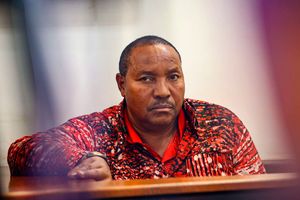Premium
Matiang’i, political violence and the shift from ‘never again’ to ‘here we go again’

Officers march during the inspectorate pass out parade at the National Police College, Kiganjo in Nyeri County on January 20, 2022. The constitutional independence of our security services has been reduced to a myth.
What you need to know:
- The constitutional independence of our security services has been reduced to a distant myth in practice.
- Thus, step by steady step, we abandon our ‘Never Again’ and rush headlong into ‘Here We Go Again’.
Last weekend, Interior Cabinet Secretary Fred Matiang’i delivered himself of some remarkable thoughts. The Sunday Nation reprinted a version of an address he had given at a meeting of senior security officials he had chaired.
The Cabinet Secretary set out the immense investment expended in enhancing the capacity of our security apparatus. Not only do “vast investments in technology” keep security actors “ahead of trouble makers”, the said actors’ “security footprint” also “sniffs out much of the trouble in advance”.
Clearly, Matiang’i’s article was partly a response to claims by the United Democratic Alliance (UDA) about political violence that was either state-sponsored, or condoned through state inaction.
UDA had sought an assurance from President Uhuru Kenyatta that “instruments of state and security apparatus would not be deployed in a partisan manner... to propel a preferred candidate to victory”.
Matiang’i devoted a lengthy portion of his article to propound his fascinating insights about the dynamics of political thuggery, placing responsibility at the feet of politicians and evading charges of “interference” and “biased by-standing”.
He also revisited his working theory of selective intervention, which dismisses certain incidents as fights over bribes and unmet political promises, and thus undeserving of security response.
And while there was perfunctory mention of security operations in Laikipia and Lamu, Matiang’i made no mention whatsoever of the insecurity ravaging other parts of the country, instead indulgently alluding to “traditional insecurity flashpoints” before making an optimistic assessment of a “preponderance of peace”.
Peaceful poll campaigns
Matiang’i also made passing reference to “the change from a Force to a Service”, which, he pointed out, “was meant to anchor a radical mindshift in police approach to duty”.
However, he did not expand on this point, perhaps tacitly acknowledging not only the gap between policy intention and police practice, but also the possibility that things may have got worse.
After all, a horrified nation was still reeling from a steadily swelling tally of bodies of murder victims recovered from River Yala, apparent victims of extrajudicial killing by our security forces.
Mind shift indeed!
However, Matiang’i’s most audacious intervention was executed more subtly. This was the securitisation of our democracy, political competition and elections, brazenly represented as the “missing link to peaceful poll campaigns”.
The article thus deploys expressions like “monitoring the political landscape for security threats”, later expounded as “security threats posed by a fluid political environment” and “politically instigated insecurity”.
All told, Matiang’i used the term “political” and its variants 15 times, “(in)security” and its variants 16 times.
Matiang’i therefore profiles elections as intrinsically fraught, and political competition – especially electoral campaigns – as inevitably dangerous.
Active security threats
This ideology is not just regressive, harkening back as it does to Nyayo’s ‘prophecy’ that (multiparty) democracy would destroy the country through ethnic violence.
It also gives excellent occasion for actors in the security sector to invite themselves as the managers and mediators of our democracy.
Under these conditions, we shift considerably from contesting assertions that security needs make legitimate claims on freedom, and enter the twilight zone where democracy and all its guarantees are categorised as active security threats in the same league as terrorism.
This is no idle conjecture: as Matiang’i proclaimed his doctrine, it was reported that Parliament had allocated Sh15 billion to the Ministry of Defence in connection with the elections. Meanwhile, proposed amendments to election laws tabled by Amos Kimunya in the National Assembly were criticised as suspicious, unnecessary or dangerous.
Our electoral regime is principally anchored on lessons learnt at dire cost.
Indeed, the impetus that yielded the Constitution of Kenya 2010 came, to a considerable degree, from the “never again” implicit in the Agenda 4 of the National Accord; a covenant inked in the blood which flowed in 2007, when all who were here feared that Kenya, with all of us, would perish for good.
Harrowing nightmare
It is traumatising to discover that powerful politicians who were around in 2007 learnt absolutely nothing from that harrowing nightmare, and relish a reversion to that volatile status quo.
The context of the proclamation of Matiangi’s is significant.
The constitutional independence of our security services has been reduced to a distant myth in practice.
The man in charge of these institutions has pledged his affiliation and support to one candidate in the forthcoming election, and proposes to convert the entire election period to a massive security operation.
Simultaneously, budgetary allocations and legislative amendments are aligning accordingly.
Thus, step by steady step, we abandon our ‘Never Again’ and rush headlong into ‘Here We Go Again’.
We must continue to pray that the Chief Justice cease the imprudent fraternisation with this hub of impunity.
Kenyans must feel that there is somewhere to go for redress, and that at least one arm of government is on their side.
The writer is an advocate of the High Court and a former State House speech writer. @EricNgeno





